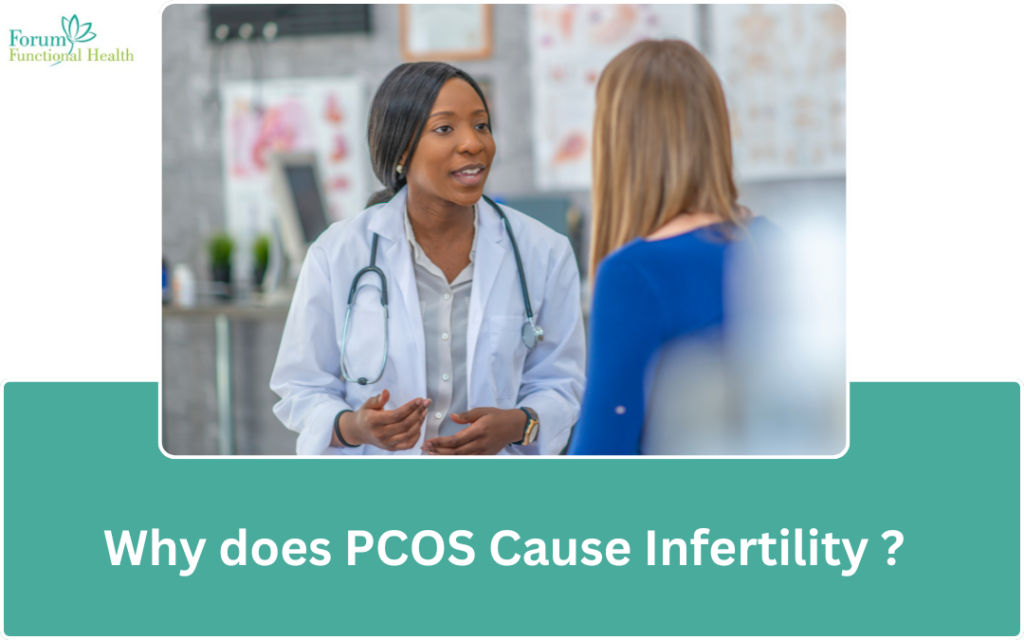Why does PCOS Cause Infertility?

Polycystic Ovary Syndrome (PCOS) is a prevalent endocrine disorder affecting millions of women worldwide. Among its myriad of symptoms, infertility stands out as one of the most distressing and challenging aspects for those affected. Understanding why PCOS often leads to infertility is crucial not only for those grappling with the condition but also for healthcare providers seeking effective treatment strategies. In this article, we delve into the intricacies of PCOS-related infertility, shedding light on its underlying mechanisms and exploring potential avenues for treatment, including options available at Forum Functional Health for infertility treatment in McKinney TX.
The PCOS Puzzle: PCOS is a complex syndrome characterized by hormonal imbalances, ovarian dysfunction, and metabolic disturbances. These factors intertwine to disrupt the intricate processes involved in ovulation and fertility. The primary mechanisms through which PCOS contributes to infertility include hormonal imbalance, ovulatory dysfunction, and metabolic irregularities.
Hormonal Imbalance: Central to the pathology of PCOS is the dysregulation of hormones, particularly insulin and androgens. Insulin resistance, a common feature of PCOS, leads to elevated insulin levels, which in turn stimulate the ovaries to produce excess androgens such as testosterone. These elevated androgen levels disrupt the normal menstrual cycle and inhibit follicular development, impairing ovulation and reducing the chances of conception.
Ovulatory Dysfunction: Anovulation, or the absence of ovulation, is a hallmark feature of PCOS and a major contributor to infertility. In a typical menstrual cycle, the ovary releases a mature egg during ovulation, which is essential for conception. However, in women with PCOS, ovulation may not occur regularly or at all due to hormonal imbalances and follicular arrest. Without ovulation, the chances of conceiving naturally are significantly diminished.
Metabolic Irregularities: PCOS is often accompanied by metabolic abnormalities such as obesity, insulin resistance, and dyslipidemia, which further exacerbate infertility. Obesity, in particular, is strongly associated with PCOS and contributes to hormonal imbalances and insulin resistance, worsening ovulatory dysfunction. Additionally, metabolic disturbances can impair endometrial receptivity, making it more difficult for a fertilized egg to implant and establish a pregnancy.
Inflammation and Oxidative Stress: Chronic inflammation and oxidative stress have also been implicated in the pathogenesis of PCOS-related infertility. Women with PCOS often exhibit increased levels of inflammatory markers and oxidative stress, which can negatively impact ovarian function and embryo implantation. Addressing inflammation and oxidative stress may therefore be an important aspect of managing infertility in women with PCOS.
Management Strategies:
Addressing infertility in PCOS patients necessitates a multifaceted approach targeting the underlying hormonal imbalances, metabolic irregularities, and ovarian dysfunction. Lifestyle modifications, including dietary changes and regular exercise, are cornerstone interventions for improving insulin sensitivity, managing weight, and restoring hormonal balance. Pharmacological interventions such as oral contraceptives, insulin-sensitizing agents, and ovulation-inducing medications may be prescribed to regulate menstrual cycles and promote ovulation.
In cases where conventional treatments prove ineffective, assisted reproductive technologies (ART) offer viable alternatives for achieving pregnancy. Techniques such as ovulation induction, intrauterine insemination (IUI), and in vitro fertilization (IVF) can circumvent ovulatory dysfunction and facilitate conception in PCOS patients. Additionally, emerging therapies targeting specific molecular pathways implicated in PCOS pathogenesis hold promise for more targeted and effective management of infertility in the future.
Conclusion:
PCOS represents a complex interplay of hormonal, metabolic, and ovarian factors, culminating in infertility for many affected individuals. By unraveling the mechanisms underlying PCOS-related infertility, healthcare providers can devise more effective treatment strategies tailored to the unique needs of each patient. Through a combination of lifestyle modifications, pharmacological interventions, and assisted reproductive technologies, individuals with PCOS can navigate the challenges of infertility and realize their dreams of parenthood.
Read More:- Understanding the Facts: How Endometriosis Influences Infertility
